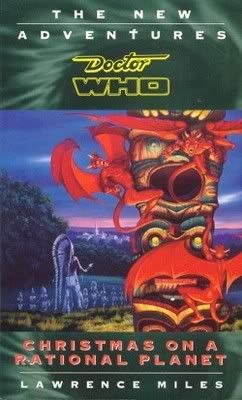
Christmas on a Rational Planet by Lawrence Miles
In Brief: As New York State parties like it's 1799 (which it is) the powers of a cacophonous universe want to replace reality.
Pardon me as I struggle to come to grips with exactly what to say about Christmas on a Rational Planet. The book is audacious, confusing, rather mad and quite quite brilliant. It doesn't so much expand the possibilities of what can be done with the continuing narrative of Doctor Who as much as cut up what has come before, put it in a blender, add some paste and mash together a novel with the result.
First I'll get that pesky thing known as "the plot" out of the way: Roz is trapped in a small town in New York State in 1799, otherwise known as The Age of Reason. As she tries to find The Doctor the Tardis (with Chris inside) is attacked by a force from outside of the universe.
Ok, now that's done we can look at the big picture of what I *think* Miles was getting at. Essentially what he tries here is a total redefinition of The Doctor and indeed the entire past history of the series itself in regards to how much it should fit into any continuing narrative. The main goal is to tear apart the past where The Doctor is the force which "puts right" the problems of the universe. In its place is the view the The Doctor imposes his Reason where he sees fits, as his role as a Watchmaker (aka Time Lord) is to bring order to chaos. However in Christmas on a Rational Planet chaos/cacophony is not a force of evil or destruction but rather the universe as it was in an earlier time, when impossible things ruled before order was forced upon reality. Order and Reason are seen as limiting factors of possibility (such as how slavish attention to the past continuity of Who limits the future).
What Miles does brilliantly is to make the voice of chaos and cacophony ironically reasonable, with a universe of disorder being an appealing proposition. In fact so appealing is this option that the day is "won" not through any defeat of chaos but rather through trickery. Chaos is only banished and will always be looking for cracks into which to place unreasonable things.
The book plays with past continuity in a major way, with minor references being made to practically every televised story in some way. This can range from flash-backs to The Power of the Daleks to the odd re-quote of Professor Zaroff and beyond. Rather than be gratuitous these references serve to reinforce the place of chaos in the Doctor Who universe. Has the show ever *really* had a consistent narrative, and in fact should it even bother? The book's answer is a resolute NO IT DAMN WELL SHOULD NOT!
It acts basically as a big middle finger to those who require that the history of the show make some sort of sense or Reason. Doctor Who has always (and should always) be a series without a "bible", one that is able to change the rules when it sees fit rather than have to adhere to some sort of unbreakable narrative which can never be contradicted.
Unlike some series starting in Star that I could mention. Where else would you end up with antire episodes devoted to the reasons behind a makeup change for the Klingons?
Miles wants to throw out notions of "continuity" and keep the concept of Doctor Who free to do what it wants, and thus having a universe of chaos just next door allows the show to contain a myriad of impossible things.
Now back to the "but is it any good?" part: Yes, Christmas on a Rational Planet breaks completely new ground in what can be done with Doctor Who. It's the first book really since the early days of Timewyrm: Revelation or Transit to completely redefine what we can think of as "Doctor Who story". It's amazing how as this part of the series history begins to close (with only 9 books left to go) once again we see an upswing in quality (echoing the 1988/89 years on TV). Doctor Who always seems to be at its best when up against the wall.
No comments:
Post a Comment